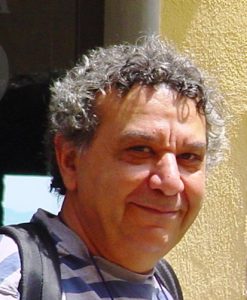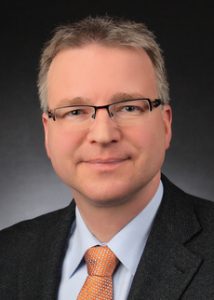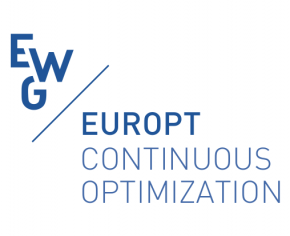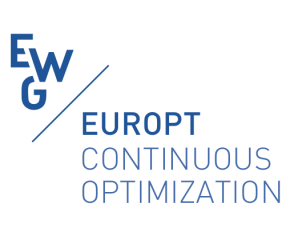School dates, venue and topics
The school took place on 1-2 August at the NOVA School of Science and Technology of the Universidade Nova de Lisboa, Portugal. The school was planned to be in-person only, no live streaming was provided. There have been two courses focusing on algorithms for optima and equilibria, specifically on
1. First order optimization methods
2. Equilibrium selection
The lectures on first order methods were delivered by Marc Teboulle, on equilibrium selection by Oliver Stein. Each day included 6 hours of lectures plus coffee breaks.
Attendance
Attendance was free of charge but with a mandatory registration. Lectures are particularly suited for PhD students and young researchers to provide them with the chance of attending two high level courses on continuous optimization, but the school was open to everyone wishing to participate.
The courses
First Order Optimization Methods
by Marc Teboulle
Optimization plays a central role in applied mathematics and widespread in the modeling of modern and complex systems covering a very broad spectrum of disparate areas, such as image science, finance, signal processing, and machine learning to mention just a few. The resulting optimization problems can be convex, often nonsmooth and even nonconvex, and are typically large scale. This necessitates the need to develop dedicated algorithms that can beneficially exploit data information and given structures in a given problem to produce simple and scalable algorithms. First Order Methods (FOM), namely iterative schemes based on function and (sub)-gradient values which share computational simplicity and essentially dimensionless iteration complexity, are natural and ideal candidates to achieve these goals.
This course will describe the fundamentals and recent advances in the theory, design and analysis of first order methods for specific classes of convex and nonconvex optimization problems, highlighting the ways in which problem structures and data information can be exploited to devise simple and efficient numerical methods for large scale problems. Key ideas underlying the building of FOM, the mathematical tools necessary for their convergence/complexity analysis, and applications will be presented in details revolving around the following five main topics:
1. Introduction: Motivation/Examples
2. Proximal Methods.
3. Smoothing Techniques
4. Lagrangian/Primal-Dual Decomposition Algorithms
5. Recent Advances: FOM beyond smoothness and Convexity.
Equilibrium Selection: A Rendezvous of Nash Games,
Multicriteria Optimization, and Semi-infinite Programming
by Oliver Stein
In their seminal work A General Theory of Equilibrium Selection in Games (The MIT Press, 1988) Harsanyi and Selten introduce the notion of payoff dominance to explain how players select some solution of a Nash equilibrium problem from a set of nonunique equilibria. To understand their approach, we first discuss the basics of Nash equilibrium problems and of multicriteria optimization in detail.
Since it will turn out that payoff dominance may not be a realistic assumption, we relax it to the more widely applicable requirement of payoff nondominatedness. Different characterizations of generalized Nash equilibria then yield different semi-infinite optimization models for the computation of payoff nondominated equilibria. At this occasion, basic ideas of semi-infinite programming will be discussed.
Since all the appearing models violate a standard constraint qualification, we also formulate regularized versions of the optimization problems. For one of them we state a nonlinear cutting algorithm which yields numerical results for a multi-agent portfolio optimization problem.
Slides
The lecturers
Marc Teboulle (Tel Aviv University)

Oliver Stein (Karlsruher Institut für Tecnologie)

Oliver Stein is full professor at the Institute for Operations Research (IOR) at the Karlsruhe Institute of Technology (KIT). He received his doctoral degree from the University of Trier in 1997, and his venia legendi in mathematics from RWTH Aachen University in 2002. His research visits include stays at Virginia Tech, University of Cambridge, and Princeton University. Oliver Stein published more than seventy papers in international journals, in areas such as continuous and mixed-integer nonlinear optimization, nonsmooth optimization, multi-leader-multi-follower games, multi-objective optimization, polynomial mappings, as well as ordinary and partial differential equations. Oliver Stein was fellow of the Friedrich-Ebert Foundation, the Alexander-von-Humboldt Foundation, and the German Research Foundation, and he received various teaching awards. He is member of MOS, SIAM, GOR, and DMV, and since 2015 he acts as Editor-in-Chief of MMOR.
Oliver Stein has been elected EUROPT Fellow in 2022.
Organisation




